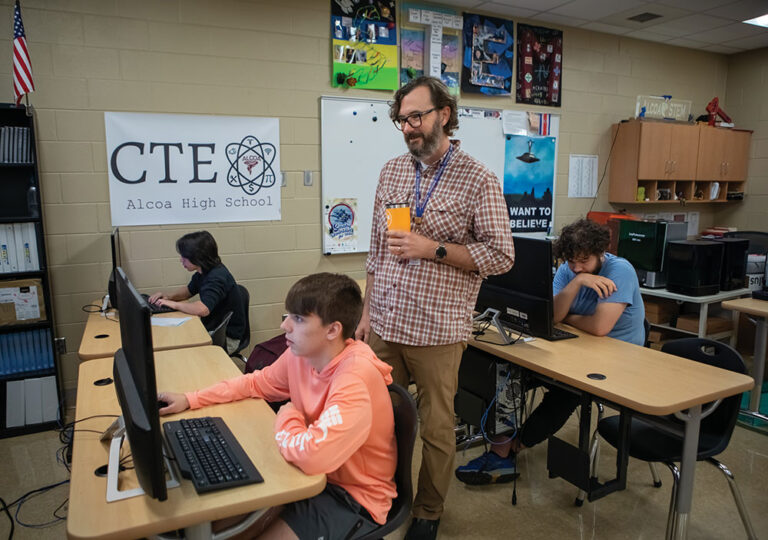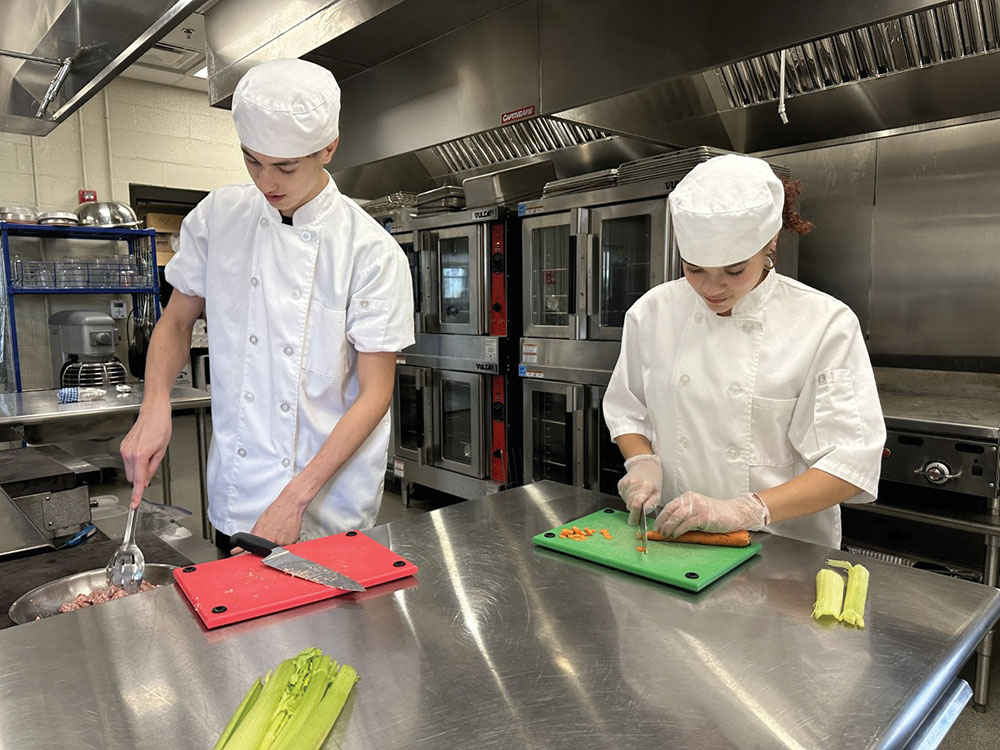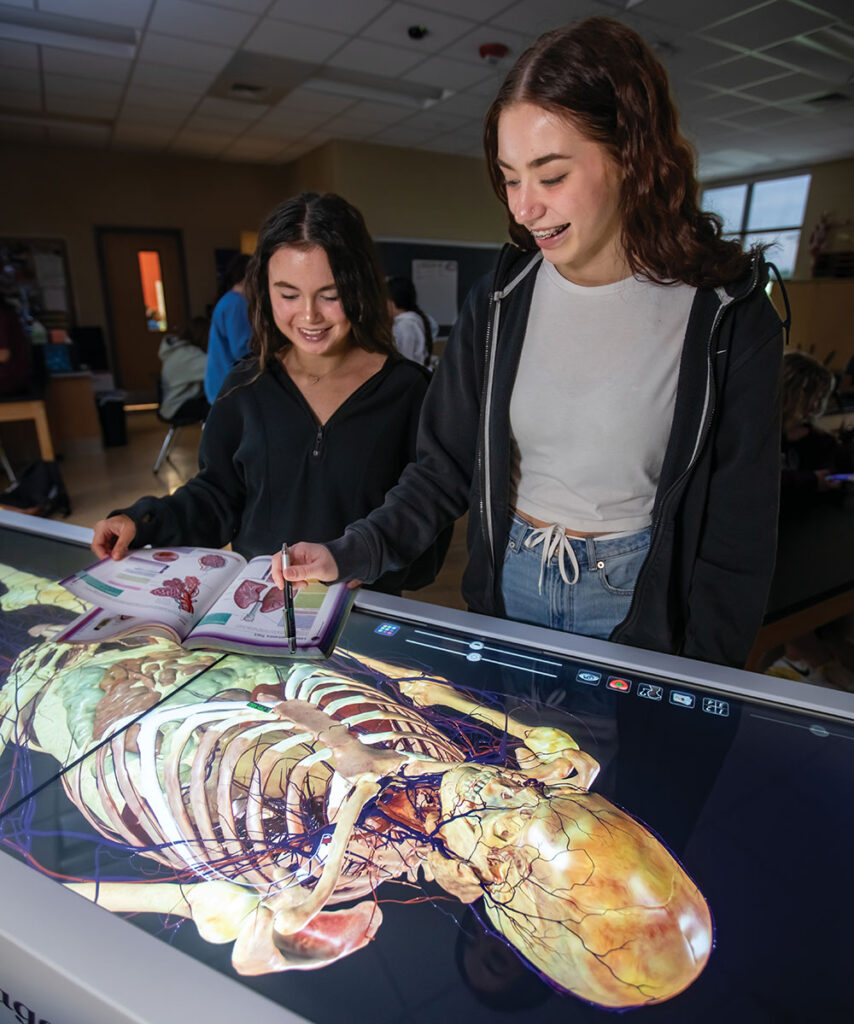Blount County Schools Put Students on Paths to Success
Career and technical education programs unlock in-demand job opportunities for students in Alcoa, Maryville and the surrounding communities.

Career and Technical Education (CTE) programs at Blount County schools offer hands-on learning experiences, often in partnership with local businesses and industry leaders, to ensure that students are trained with the latest technology and practices in their field of study.
These programs, such as Careers in Motion, a Tennessee Pathways/Tennessee Department of Education grant-funded project in all three school districts – Blount County Schools, Maryville City Schools and Alcoa City Schools – introduce students to local career pathways, prepare them for immediate entry into the workforce, and help bridge the skills gap between employers and job seekers.
In This Article
Career Exploration Starts Early
Through the Careers in Motion grant, the school districts created a mobile, career exploration lab to share hands-on activities with preK-8 students across the county and spark interest in varying career paths.
“At the middle school level, we have begun to offer CTE courses that focus on career exploration. We also utilize online platforms to assess interest and aptitude, including YouScience and Pathful,” says Patricia Thomas, director of career and technical education for Alcoa City Schools. “The work done in grades preK-8 then helps students decide on high school programs of study.”

Remodeling and Rethinking the Classroom
Thomas says the district’s CTE programs prepare students for local jobs by utilizing equipment that is representative of what is being used by its industry partners. In 2023, for example, the district used a $1.5 million state grant to establish a high school culinary arts program. Funds were used in part to convert a common area at Alcoa Intermediate School into space for culinary arts classes. The district also plans to purchase a food truck and catering van to give students hands-on experience.
The culinary arts program at Maryville City Schools also received an upgrade in 2017 when the former Downtown Autobody building was transformed into state-of-the-art classrooms and the student-run Café le Rêve.
In 2022, the Blount County Board of Education approved $1 million to add new science labs at Eagleton College and Career Academy and renovate the science wings at Heritage and William Blount high schools. The investment in infrastructure is a testament to the school districts’ ability to respond to local workforce needs.
Collaboration Is Key
“Each of our CTE career pathways has an advisory council made up of business/industry stakeholders who provide information on workforce development skill needs. Blount Partnership and work-based learning employers also share skills they need our schools to teach,” says Amanda Hill Vance, supervisor of instruction and district communications for Blount County Schools.
Alcoa City Schools also work closely with the Blount Partnership to assess local workforce needs.
“The Partnership hosts our federally required CTE advisory committee meetings during which we receive valuable updates from employers and postsecondary partners. This information guides our decisions surrounding programming, including industry certification and technical training offerings at the high school level,” Thomas says.

Leading by Example
In addition to needs assessments, the Blount Partnership facilitates an annual Eighth Grade Career Exploration Fair and works with the school districts and its industry partners to create work-based learning opportunities for students.
“Blount County Schools hosts business stakeholders as guest speakers, and they participate in career fairs to discuss with teachers and students the skills needed in the workforce,” Vance says. “We connect students with work-based learning opportunities through school-based, work-based learning coordinators. CTE career pathway advisory council stakeholders, the Blount Partnership and employers reach out to the school district to let us know that they are interested in being a work-based learning employer.”
Vance says CTE programs are vital to the region’s workforce development efforts because they provide students with an opportunity to develop specific academic, technical and 21st-century skills necessary to be successful in career and in life.
Thomas says CTE programs can also help students learn to be community leaders.
“Students gain valuable employability skills through classroom instruction and labs and through our work-based learning programs,” she says. “Through these avenues, students learn vital soft skills, including time management, critical thinking, initiative and self-direction. Students also learn how to be part of a team and to solve problems and gain valuable leadership skills.”

Partnership Powers the Future
As current employees retire and the number of jobs in advanced manufacturing grows in Blount County, keeping a pipeline of talent flowing to the industry is increasingly vital.
A partnership between Pellissippi State Community College and Arconic, a company specializing in lightweight metals engineering and manufacturing, will help the county’s high schoolers get a head start to college and careers while exploring the local opportunities available in manufacturing.
Through the Arconic Foundation, the company awarded the college $80,000 to expand CTE dual enrollment courses in electrical engineering technology for 11th and 12th graders at Alcoa City, Blount County and Maryville City high schools. Dual enrollment allows students to simultaneously earn both high school and college credit, which reduces the amount of time and money they must spend on postsecondary education.
“This pilot project addresses some of the most common barriers to dual enrollment participation, providing funds for tuition, fees, books and other course materials for up to four courses per participant, per semester,” says L. Anthony Wise, president of Pellissippi State Community College.
The courses, which are free to students, are taught at Pellissippi State’s Ruth and Steve West Workforce Development Center. Students can earn a certificate in electronics technology and industrial automation as well as credits toward Pellissippi State’s associate of applied science in electrical engineering technology.
“Our hope through the grant was to increase the awareness and attractiveness overall of manufacturing jobs in the area and provide greater access to programs at the new workforce development center,” says Christy Newman, communications manager for Arconic.
Get to Know Blount County
Want to learn more about living and working in Blount County, TN? Check out the latest edition of Livability Blount County, Tennessee.
